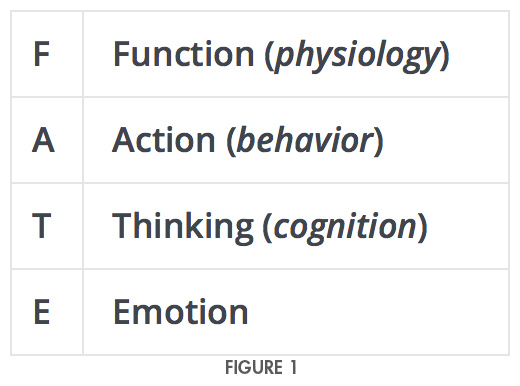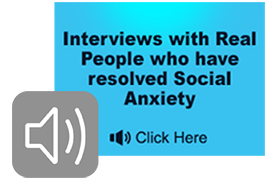About the Psychotherapy at Berent Associates
Jonathan Berent’s therapy program is based on 33 years of clinical experience with approximately 10,000 individuals of all ages since 1978. Treatment is available for adults, adolescents, children, and families.
What kind of therapy is it?
 Psychotherapy integrates the domains of physiology, behavior, cognition, and emotion. Think of F.A.T.E. (See Figure 1).
Psychotherapy integrates the domains of physiology, behavior, cognition, and emotion. Think of F.A.T.E. (See Figure 1).
There are many manifestations of social anxiety including public speaking anxiety, fear of speaking in public, selective mutism, extreme shyness, panic and anxiety attacks, performance anxiety, obsessive perfectionism, school phobia, avoidant and dependent personality, and more.
There are many degrees of social anxiety disorder, as well as a dramatic range in “functioning levels”.
While there are numerous manifestations of social anxiety, there are two types of individuals who have social anxiety disorder; individuals with “initiative, and individuals without “initiative”. When individuals without “initiative” are the focus of treatment, parents are integrated into the treatment process in order to facilitate clinical efficacy regarding the avoidance-dependence syndrome.
Psychotherapy works with the “whole” person utilizing a systems and eclectic model. Treatment is based on the philosophy that the most valuable asset in life is time. Therapy is goal oriented and directive.
Is it Cognitive Behavioral Therapy?
While cognition and behavior are obviously important, therapy is not limited to cognition and behavior. Without integrating emotional and physiological variables, as well as considering the avoidant-dependence dynamic when indicated, treatment productivity for social anxiety would be limited.
Core Work and Technique
“Technique” is important for managing the adrenaline-driven visceral response that dramatically impacts social anxiety suffers, as well as for other objectives. However, the objective of the therapy program is to resolve the root cause of social anxiety which requires analytical and emotional work concurrent with developing a functional understanding of the personality type in which the social anxiety is encased. The primary types are avoidant, dependent, obsessive, and narcissistic.
How long will it take?
How fast can you run is the answer to this often asked question. There are numerous variables to consider regarding one’s therapeutic learning curve for social and performance anxiety. These include motivation, length and severity of the anxiety, degree of obsessive worry, expressive ability, ability to integrate new concepts, emotional and social intelligence, as well as intellectual intelligence, and last but certainly not least, readiness to face fear. Individuals who are looking for a quick fix or simple “technique” to resolve a long standing problem are encouraged not to engage.
Sessions with Jonathan are $260 for 30 minutes; with an associate $125 for 40 minutes. Therapy is available in the Great Neck office and via telephone, and Skype. Insurance coverage is on an “out of network” basis only.
Pharmaceutical management, biofeedback training, and group therapy for certain conditions, are available as an adjunct to psychotherapy. 516-872-9383



